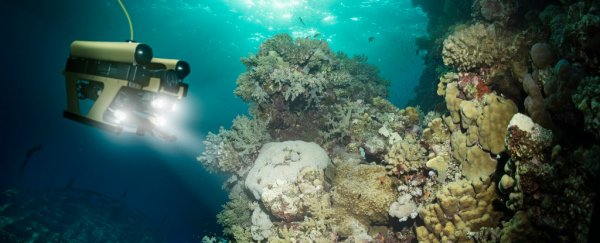As the world's population scales to ever-greater heights, a growing demand for resources is driving humans to new lows.
In the next few years, commercial mining on the deep ocean floor could become a real possibility. But with several permits already issued, a new report suggests the mining industry is racing to the bottom in more ways than one.
Researchers at the University of Exeter and Greenpeace are now warning that a deep sea "gold rush" for minerals and metals could wind up causing irreversible damage to what are already fragile ocean ecosystems.
"Many marine scientists are concerned that, once the first commercial contract for mining is issued, there will be no going back," says co-author Kathryn Miller, a researcher at Greenpeace International.
"Before that happens, we should be absolutely certain that we have looked carefully at all the other options for a more sustainable future."
The deep ocean, which includes anything at depths below 3,000 metres, covers nearly 50 percent of Earth's surface, and even though only a fraction of this area has been explored, these mysterious depths are full of untapped treasures.
Somewhere out there, leagues beneath the sea, amid a world teeming with countless kinds of marine life, lie unplumbed riches of manganese, sulphide, phosphorite, and, yes, even diamonds.
It's too much for the mining industry to ignore. And several companies, like Nautilus Minerals and Diamond Fields International, suggest that digging up these materials will ensure a steady supply of resources for decades to come.
But even if this is true, there are valid concerns that deep-sea mining is not in the interests of humanity or the world at large. The new report, written by science and policy experts, argues that the social and economic benefits will likely come at a steep cost - one that the oceans may not be able to afford.
Even today, there is so little that we know about the ocean and its contents. It's hard to say what the potential damage from deep-sea mining could be, because the scale of this region is so vast and our knowledge is so limited.
The little that we do know suggests the disturbance will be unwelcome. In fact, some scientists think the practice could lead to widespread habitat loss and species extinction.
"A growing consensus among marine scientists is that at any scale seabed mining will systematically deplete resources, disturb, damage or remove structural elements of ecosystems, cause biodiversity loss and impact ecosystem services," the report predicts.
The losses, the authors say, will be on a scale so great that much of this will be practically irreversible. Even if we wanted to, it would be expensive and extremely difficult, if not impossible, for these fragile areas to fully recover.
Marine ecosystems are currently facing more threats than you can shake a stick at. From climate change and ocean acidification, to pollution and offshore drilling – not to mention pressures from shipping and fishing – these underwater worlds are already exposed to countless human-caused hazards.
If we give them another burden to carry, the added pressure could cause the whole thing to topple over.
As such, the report is calling for extreme vigilance. The coherent and effective policies put forward by the authors include greater ocean research, more marine protected areas (MPA), and a regulatory body that is transparent about its choices.
That last point is a particularly important one, as right now, the management of seabed mining lacks transparency in many respects - so much so that it's been described as a meeting "about half the planet behind closed doors."
But despite what the mining industry might think, there is another choice. The report claims that a "circular economy" based on reusing and recycling metals could be enough on its own to reduce our unsustainable consumption of materials.
One of the authors of the new study, David Santillo, a marine biologist at the University of Exeter, says it boils down to one question:
"Should we allow seabed mining – with the risk it poses to deep-sea ecosystems – or should we focus instead on reducing this demand for virgin minerals?"
Before we make any rash decisions, we should think carefully about the answer.
The study was published in Frontiers in Marine Science.
